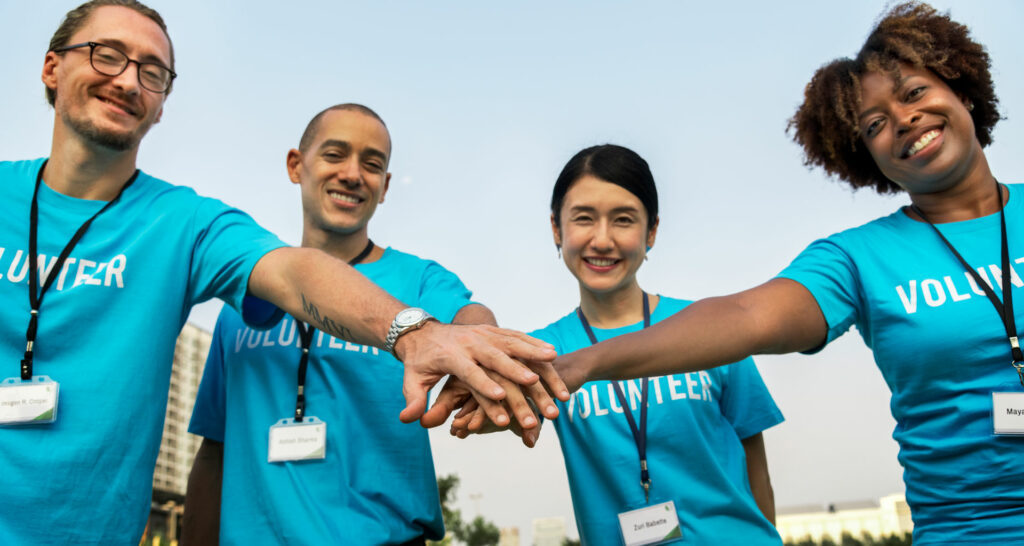Mike’s Story
I realized at a young age that I had a fairly privileged life so, when I started college, I wanted to help people who didn’t have what I had. While at college, I discovered that I could offer my training as a massage therapy student at different events, and I started doing mini treatments at Dragon Boat races, Relays for Life, and MS walks. This introduced me to the health charity world and the importance of fundraising – it was powerful, seeing how fundraising helped those affected by a disease.
Through college, I continued to assist with events as my schedule allowed. After graduating, I started working in sales and to augment the repetitive workdays, I asked the owners if I could devote some time to charity work. It would be fulfilling to me, and I showed them that this would increase the company’s public profile. I jumped in with both feet and planned a Cops for Cancer event in Peterborough. I loved the planning; I loved raising money for those in my community affected by cancer.
I also learned a lot about the Canadian Cancer Society, and about the disease itself. I was asked by the Kingston local chapter if I would consider being a workplace business ambassador for their stopping smoking campaign. I agreed and assisted by approaching local businesses to see if we could place posters and have information days at their workplaces.
When I moved back to Lindsay, I knew that I would have to help in this community as well. I volunteered with the homeless shelter and recruited volunteers.
In 2008 I started working for the Ontario government as an ambulance communications officer. This job was very demanding and hard on the brain and body. During that time, I was also a volunteer fundraising canvasser for the United Way. This led me to apply for and be accepted as a seconded employee with my local United Way. I learned so much from the executive director. I was:
- able to better understand the impact of donations on the charities’ ability to offer community services and programs.
- able to see how many agencies and charities were underfunded but continued the best they could with what they had. I met devoted people like the ED of Big Brothers Big Sisters who would lay himself off to keep the doors open and programs running.
- able to meet so many selfless life-long volunteers that felt so strongly about their causes.
I honestly did not want to go back to my regular job, there was so much good work still to be done! I was asked to join the board of directors so I continued to assist with the charity, help with events, making recommendations on funding and grant decisions, financials, and governance. UW is a great charity to support social programs and services in your community.
However, my many years as an ambulance dispatcher had taken a toll on me; my mental health had deteriorated; I developed PTSD. And suddenly I was one of the people that charities helped and eventually I felt I could return to work.
As I could not return to my old job, I found an opportunity working for MCCSS, ending up in the Intake and Benefit Administration Unit (IBAU). While there, I volunteered to be a fundraising canvasser for the United Way and Federated Health for a couple of years. My managers supported my involvement. It was fun to plan events with the volunteer team for the branch and unit. I learned a lot about Federated Health Charities and the work they do and was surprised that it was solely funded by government employees.
When I started talking about the campaign at townhalls and meetings I was also surprised at how these 21 charities really affected almost everyone I talked to. I would hear about a grandma with Alzheimer’s, a mum with MS, an aunt with Crohn’s, and a neighbour with cerebral palsy. This really strengthened my belief that we were supporting the right charities.
The stars must have aligned when I was selected for a one-year secondment with Federated Health Charities, and I appreciate IBAU management supporting me on this journey. I immediately knew I was in the right place for the next year.
Personally, I am well acquainted with the mental health charity Institute for Advancements in Mental Health and its affiliates. My grandmother had Alzheimer/dementia at her end of life and my family and I sought advice from the Alzheimer Society to properly understand how to interact with my Oma during the times she wasn’t lucid. My spouse is a type 1 diabetic and Diabetes Canada was a wealth of information. My aunt has Crohn’s disease and the support of the Crohn’s and Colitis folks after her surgeries was invaluable. I have fundraised in the past and planned events for the Canadian Cancer Society and MS Canada. I frequently donate to the Heart and Stroke Foundation as my grandfather died from a heart attack and one of my long-term clients had a stroke – their research is ongoing and effective. Some of my closest friends have children with autism. I could go on and on with all of the 21 charities – especially in my role as a caseworker with ODSP – so many clients are affected by these diseases too.
I think all of us in provincial public service know someone affected by these diseases too – that is why helping where and how you can is very important through both donating and also volunteering.
I would encourage everyone to visit the Federated Health Charities website Federated Health Charities – Home and to watch the videos from each charity to see the work that they are able to do because people like us give generously each year through Federated Health Charities. And donate now through WIN or during the upcoming spring campaign, April 1 to June 28.
